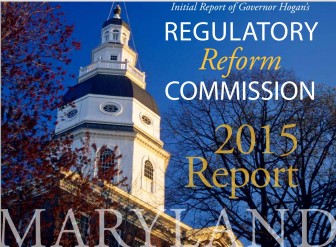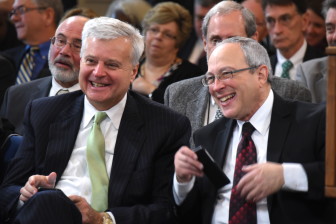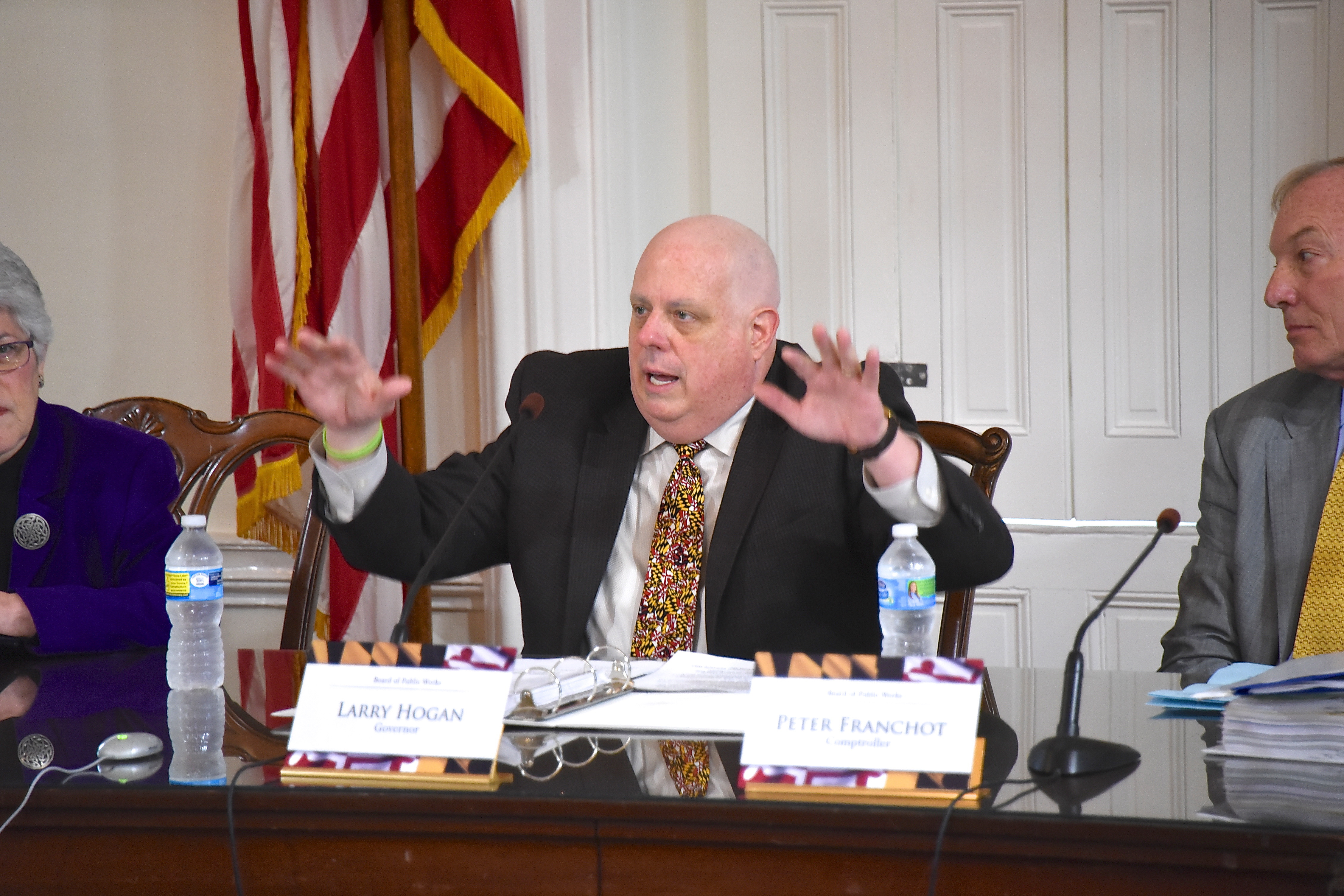By Len Lazarick
 Gov. Larry Hogan’s Regulatory Reform Commission is recommending a massive overhaul of Maryland’s “convoluted” governmental structure along with a host of small and medium-size changes to streamline regulations and focus state employees on helping businesses and citizens.
Gov. Larry Hogan’s Regulatory Reform Commission is recommending a massive overhaul of Maryland’s “convoluted” governmental structure along with a host of small and medium-size changes to streamline regulations and focus state employees on helping businesses and citizens.
“We have to fundamentally change the mindset of the state’s regulatory mission from one of glaring bureaucracy looking to punish and change it into a customer service base,” Hogan said as he touted the commission’s initial 30-page report at the Board of Public Works meeting Wednesday.
“We want to change the entire culture of state government to one of customer service … to change the mindset that you’re guilty until proven innocent,” the governor said.
Hogan admitted he and his staff “haven’t had the opportunity to review” all of the commission’s recommendation yet, but he clearly liked what he saw.
Bigger problem than high taxes
Hogan set up the commission in July to deal with one of the biggest complaints he heard on the campaign trail, “even more than taxes are too high” — that Maryland regulatory process is slow, cumbersome and unresponsive compared to Virginia’s.
“We heard it over and over and over again,” Hogan said.
So did the 11-member commission, getting an earful from more than 450 citizens who came to more than 24 hours of hearings at six locations across the state, according to the commission chairs. In addition, the commission website got more than 200 comments and suggestions.
The first part of the report quotes dozens of these witnesses by name, mainly government officials and business representatives.

James Soltesz, left, and Abba David Poliakoff, co-chairs of the Regulatory Reform Commission. Governor’s Office Photo
“Although the Commission had expectations of hearing almost exclusively specific regulatory recommendations, the fact is that the vast majority of citizen and business testimony dealt with the need to change the culture of state agencies and the way they interact with the public,” co-chairs James Soltesz and Abba David Poliakoff wrote in a letter to the governor. “It is to these concerns that our primary recommendations are focused.”
Top recommendation: Overhaul government
Their top recommendation is that Hogan “undertake a comprehensive review of Maryland’s state government structure, its regulatory environment, responsibilities, and functions with the goal of reorganizing state government to improve efficiency, accessibility, technology, customer service and adaptability to a rapidly changing business environment.”
Gov. Marvin Mandel reorganized Maryland government 45 years ago, and it needs a redo to bring the state into the 21st century, the report says.
The commission found agencies and departments with overlapping authority, creating duplicative review of plans and permits. The report recommends:
- Enforcement of new customer service standards — such as responding to all phone calls, emails and letters within 24 hours;
- A centralized one-stop shop and call-center for inquiries and referrals;
- Maximizing the use of electronic filings;
- Updating “antiquated” technology that makes it difficult for agencies to share information with each other or businesses.
- Quicker and more definitive responses to all plans, applications and forms.
- Review of all professional license standards and continuing education requirements to make sure they are up-to-date and actually protect citizens. But the report concedes, “Changing or updating professional licensing takes a herculean legislative effort.”
- Joint work groups to speed up review of major development projects.
Better customer service
Customer service and the lack of it was a consistent theme.
“It is no secret that Maryland’s state government has long held a glaring bureaucratic, uncooperative reputation,” the report said. “This is a systemic, cultural disease that needs to be eliminated. Response times are inconsistent and often, it requires communication with an elected official to get the wheels turning.”
“Many business owners have protested that state regulators focus on finding reasons why something cannot be done, when in fact the emphasis should be on how (if possible) it may be legally accomplished.”
“This really is not a Republican or Democratic issue…We’re going to work very hard to change the attitude of state government,” Hogan said. He then lapsed into a familiar campaign mantra: “We’re here to get the government off of our backs and out of our pockets.”
“This is going to be a primary push for us.”
The commission also acknowledged some progress that 10 state departments had already made in implementing some of its recommendations.
Nitty gritty
While the commission took a broad overview of some problems and issues, it also delved into specific regulations that needed change.
- License costs: “The cost of licensing and the actual license fees should be reexamined, as they have risen dramatically over the last 10 years. As an example, the fee for a permit to run summer camps jumped in less than 10 years from $75 to $500.”
- Cemetery owners voiced concern about the fees being charged, both for licensure as well as per burial.
- Mortgage lender licensing was outdated and overlapped new federal rules.
- Nutrient pollution trading between developers and farmers was also endorsed for “a market-based approach to reducing pollution in the Bay.”
- State procurement should be more centralized.
Vineyards and food trucks
The commission even got into regulations for vineyards and food trucks.
At vineyards, state regs said “wine and (hard) cheese could not be served to the public on the premises unless special equipment was installed for draining oils from grilled cheese – even though the cheese was not being grilled.”
State requirements for food vending trucks were even higher than those for restaurants and “unreasonably burdensome,” such as banning the sale of most food on state roads, yet permitting the sale of seafood and flowers.




At first glance this looks like a report whose recommendations make quite a bit of sense. I have not read the entire report. However, hope this does not turn into a fight to save public sector jobs.
I have just getting $ 8765 within one month.I am connected with a business entity that outsource online jobs . I heard about it last year and I have made such great cash . It is great and I am just so happy to have that option ……. Look here for details …
===>>> Visit Website in my ??o????
93
I suspect that his just an excuse by Hogan to reorganize government and hire a bunch of Republicans and eviscerate regulations.
I didn’t see any evidence in the (underwhelming) report that this commission knows how to begin overhauling and reorganizing state government. Hardly a clue of the scope, structure or objectives of this effort, just a headline. Does the commission appreciate that neither it nor state government at large has the least capability to overhaul anything with respect to major portions of state programs and activities? For instance, 30% of the State’s budget comes from the Federal government whose heavy-handed regulations and overlapping and duplicative programs are the root cause of much of the negative culture, overlap and duplication in the state. I wish the commission all possible success.